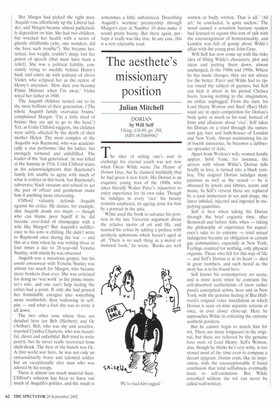The aesthete's missionary position
Julian Mitchell
DORIAN by Will Self Viking, £16.99, pp. 288, ISBN 0670889962 The idea of selling one's soul in exchange for eternal youth was not new when Oscar Wilde wrote The Picture of Dorian Gray, but he claimed truthfully that he had given it new form. His Dorian is an exquisite young man of the 1890s, who takes literally Walter Pater's injunction to enjoy experience for its own sake. Though he indulges in every 'vice' his beauty remains unaltered, its ageing done for him by a portrait in the attic.
Wilde used the book to advance his position in the late Victorian argument about the relative merits of art and life, and taunted his critics by adding a preface with aesthetic aphorisms which haven't aged at all. 'There is no such thing as a moral or immoral book,' he wrote. 'Books are well written or badly written. That is all.' All art,' he concluded, 'is quite useless.' The novel caused a sensation because readers had learned to equate this sort of talk with the encouragement of homosexuality, and London was full of gossip about Wilde's affair with the young poet John Gray.
Will Self has now come up with the risky idea of lifting Wilde's characters, plot and ideas and putting them down, almost unchanged, in the 1980s and 1990s, Where he has made changes, they are not always for the better. Pater and Wilde had to tiptoe round the subject of gayness, but Self can kick it about in his period Chelsea boots, leaving nothing to the imagination, no orifice unplugged. From the start, his Lord Henry Wotton and Basil (Baz) Hallward are in open competition for Dorian's body quite as much as his soul. Instead of hints and allusions about 'vice', Self takes his Dorian on a trawl through the tumescent gay bars and bath-houses of London and New York. Always maintaining his air of boyish innocence, he becomes a deliberate spreader of Aids.
Apart from Wotton's wife, women hardly appear. Sybil Vane, for instance, the actress with whom Wilde's Dorian falls briefly in love, is turned into a black rentboy. The original Dorian indulges many passions as well as the sexual — he is obsessed by jewels and fabrics, scents and music. In Self s version these are replaced by a total immersion in sex and drugs, the latter inhaled, injected and ingested in stupefying quantities.
Self is best when taking his Dorian through the brief orgiastic time, after Stonewall and before Aids, when — taking the philosophy of experience for experience's sake to its extreme — total sexual indulgence became an obligation in certain gay communities, especially in New York. Feelings counted for nothing, only physical orgasms. Those who fell for this way of life — and Self's Dorian is at its heart — died in great numbers, and such moral as the story has is to be found here.
Self knows his contemporary art scene, and is most acute when he contrasts the self-absorbed aestheticism of (now rather passé) conceptual artists, here and in New York, with the genuine feeling of Baz Hallward's original video installation in which Dorian is seen on nine separate screens at once, in ever closer close-up. Here he approaches Wilde in criticising the extreme aesthetic position.
But he cannot begin to match him for wit. There are many longueurs in the original, but these are relieved by the genuine bons mots of Lord Henry. Self's Wotton, alas, though he thinks he's very witty, is too stoned most of the time even to compose a decent epigram. Dorian ends, like its inspiration, with the unexceptionable if banal conclusion that total selfishness eventually leads to self-extinction. But Wilde reworked without the wit can never be called well-written.


































































































 Previous page
Previous page